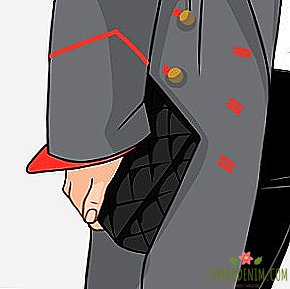What is fruitorialism and what does it eat?

Natasha Fedorenko
"Why is it worth eating only fruit?", “Raw food or fruitorism?”, “Fruitorism against arthritis” - in recent years, more and more bloggers have appeared in the Russian segment of youtube with tens of thousands of views who claim that they eat only fruit and feel great. The most successful of them conduct public seminars and individual consultations, where they tell how to switch to one of the most radical forms of raw food.
Fruitorianism is not just a short-term diet that promises a specific result, but a long way of feeding with its own ideology, values and often esoteric background. Fruitsology is a direct consequence of the utopian wave of the 60-70-ies, when the principle of eating food was not separated from the political and spiritual component. For example, vegetarianism was viewed both as resistance to the "atrocities of capitalism" and as an indispensable condition for spiritual enlightenment. The communes of the 1960s and 1970s experimented with growing one that was edible regardless of mass production (some handed out this food free on the streets of San Francisco), and in order to achieve the maximum level of "cleanliness of the body" and austerity. For example, a macrobiotic zen diet in one of the variations consists of seven steps, each of which implies the rejection of new products - ideally, the human diet should be limited to cereals (sometimes one rice), and the body supposedly will reach maximum purity by this point.
"Before the transition to raw foods, I had serious health problems, but over time, acne appeared, the sinuses began to clog up, the weight went up, incomprehensible dandruff appeared. For several months I could not admit that it happened because of cereals and nuts" - says blogger Uliana Ro, who refused vegetables in favor of some fruits. Fructorianism, as macrobiotics and raw foods, passes under the flag of ridding the body of "toxins and toxins," as well as a way to cure all diseases through a massive cleansing of the body. When raw foods turn out to be “too compromise and dirty” - distilled fruitarianism comes to replace. Although the gurus themselves urge to act gradually and begin a large-scale reform of their diet with a compromise vegetarianism.
In the most utopian view, a fruitarian must forget about fruit from supermarkets and even markets, and instead pick fruit straight from the trees.
The concept of cleanliness here refers not only to parasites (we have already written about why mass poisoning with them is a myth) and toxins, but also directly to the body. Like many fruit-eaters, the Russian blogger Andrei Happiness declares that he has not washed his head for two and a half years, only occasionally rinses his body with water and, thanks to his food system, has forgotten about soap, deodorants and creams. The fruit diet promises clean skin: its supporters unanimously tell how acne, wrinkles, dandruff and even psoriasis pass after the adoption of a new nutrition system.
Fructorianism, simplifying, called numbers - "80-10-10". Where 80% of the diet is fruit, and 10% for fats and proteins. This 20% leaves maneuver to include vegetables, sprouts and nuts in the diet. The truth is usually avocado is used as a source of proteins and fats (formally, the fruit is classified as a fruit), if possible it is replaced with a similar composition durian (famous for smelling unpleasant, but sweet in taste) - in Russia it is not so easy to get it.
At the same time, the most loyal fruit-eaters often don’t like nuts, vegetables and sprouts: Andrei Happiness "had a long break on avocado," and Uliana Ro decided to give up greens, "because she felt weak from her." Among adherents of fruitorialism, as in any ideologically charged community, there are fierce debates about whether bananas can be eaten, is it true that real fruit-eaters will never touch the nightshade (for example, tomatoes) and green onions. Distrust of vegetables and cereals is understandable: fruitarianism calls us to return to the way of nutrition of the pre-agrarian period as the most “natural” for a person. In the most utopian view, a fruitarian must forget about fruits from supermarkets and even markets, and instead pick fruit straight from the trees.
Experienced Fructorians, of course, prophesy a cure for all diseases when switching to fruit, but the promise of enlightenment is of considerable importance. Still, the most famous adept of this food system is Steve Jobs, who has experimented all his life with starvation, syroedenie and veganism. Cleaning the body promises not only good skin, but also add energy, intelligence and creativity. However, when Ashton Kutcher was preparing to play Steve Jobs in the biopic of the same name and tried to switch to fruitorism, he was in a hospital a month later because of problems with the pancreas.
Despite the fact that adepts promise only good mood and health from fruits, experts believe that its supporters have a high risk of lack of nutrients. “First of all, it concerns proteins, the main resource of which in fruitorism are seeds and nuts, but given their small amount in the diet, fruitorians are at risk of protein-energy deficiency,” says Masha Budritte, a nutritiologist and a graduate of King’s College London. Another problem, in her opinion, can be considered the almost complete absence of so-called good fats in fruits, primarily omega-3 type fatty acids. The lack of these substances in the body can lead to disorders of the nervous and immune systems, as well as skin problems. In a normal diet, the main source of these acids is fatty fish, but they can also be found in some seeds and their oils, such as chia, flax and rape. Unfortunately, most of these products are excluded from fruitorialism, Budrita explains.
Ignoring medical advice and signs of malaise, adherents of the fruit diet may face more serious problems than fatigue.
"In such a diet, vitamin D and calcium are extremely lacking, which in combination can lead to osteoporosis. And if vitamin D deficiency can be replenished while in the sun, calcium is present in green vegetables, which fruiting is not very welcome," said the nutritionist. A high level of sugar and acidity of fruits, especially if the diet includes a lot of juice, can lead to problems with the teeth and pancreas, which releases insulin in response to an increase in blood glucose. In people with diabetes, this function is impaired, and for them fruitorialism may simply be life threatening, says Budrita. In addition, fruitarianism, like any nutritional system that calls for "body cleanliness" and severe restrictions, can cause eating disorders and especially orthorexia.
Food systems such as fruitarianism are not without the occult component, which can have unexpected health effects. “Fruits are filled not only with microelements, but also with life energy - prana. And therefore, switching to fruitorism, you no longer feed with microelements, but prana - a more advanced source of energy,” states blogger Violeta Petrova. Ignoring medical recommendations, science, and obvious signs of indisposition — such as the disappearance of menstruation, “imposed by the system,” adherents of the fruit diet may face more serious problems than fatigue. Thus, the author of the concept of "80-10-10" Doug Graham was banned from participating in The Woodstock Fruit Festival, the largest American fruit-eating festival, because his apprenticeships on fasting had brought some of his students to death before the death. For this training, they paid 13 thousand dollars.
Photo: nerudol - stock.adobe.com




